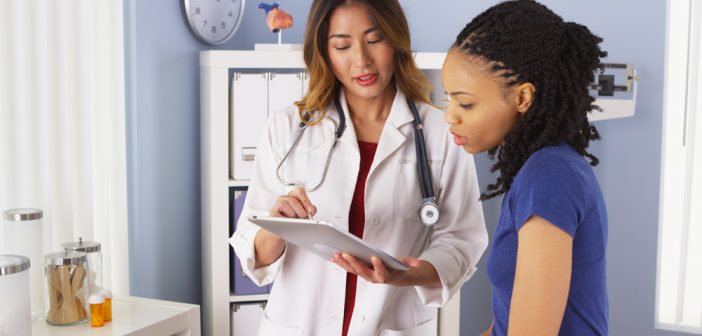It’s important for women to schedule routine health screenings so potential issues can be detected early on. Did you know that women are at a high-risk of contracting breast and cervical cancer? Besides health screenings, every woman should make time for healthy habits. Regular exercise and eating healthy can also help with stress management.
Blood Pressure Screening
When you reach 18-years-old, you need to start having your blood pressure checked every two years. This health screening involves wrapping a cuff around your arm and pumping it tightly. The recommended blood pressure for women is less than 120 over 80 millimeters of mercury. Most health insurance companies cover blood pressure screenings, but if your health insurance company doesn’t, sign up for a free blood pressure screening in your community. Local drug stores can check your blood pressure too.
Cholesterol Screening
When you reach 20-years-old, you need to start having cholesterol screenings at least every five years. This screening involves drawing a blood sample by simply pricking your finger. If you don’t have health insurance or if your insurance company doesn’t cover cholesterol screenings, call to see if your local community health fair offers free screenings. If you get a high reading on the test, you’ll be referred to a doctor for a follow-up examination. The recommended reading is below 200 milligrams of deciliter for total cholesterol. Cholesterol screenings are important for decreasing your risk of heart disease.
Mammogram Exam
When you reach 20-years-old, you need to start having a clinical breast exam at least every three years until you turn 40-years-old. After you turn 40-years-old, breast exams should be done every one to two years. During a mammogram exam, your doctor will use their fingers to determine if your breasts have any lumps or abnormalities. During the screening, a machine will apply pressure to your breasts while an X-ray image is captured.
Pelvic Exams
When you turn 21-years-old, you’ll need to start having pelvic exams every two years to check for any abnormalities in your reproductive system. If you become sexually active before 21-years-old, you’ll need to start having pelvic exams done earlier. After you turn 30-years-old, you’ll need to start having pelvic exams every three years if your last three tests results were normal. A speculum will be placed in your vagina to widen your vagina so that your doctor can take cells from your cervix. After the doctor removes cells from your cervix, they’ll determine if there have been any cell changes. Cell changes can lead to cervical cancer. During this exam, the doctor may also check for sexually transmitted diseases.
Blood Glucose Tests
When you turn 45-years-old, you’ll need to start having blood glucose tests done every three years to check for diabetes and pre-diabetes. If you’ve had symptoms of diabetes or risk factors, you may need to get blood glucose tests done before you turn 45-years-old.To complete this exam, a blood sample will be drawn at the lab. The recommended reading is below 100 milligrams per deciliter. Any reading higher than this suggests that you have pre-diabetes or diabetes.
Bone Density Test
When you turn 65-years-old, you’ll need to start having a bone density test. The bone density test will determine if you have osteoporosis. If you have any risk factors for osteoporosis, you’ll need to start screening earlier. Having a slender frame or fractured bones are also considered risk factors. To complete this screening, you’ll be asked to lie on a table while a machine takes X-ray images of specific bones in your body. Healthy bones show a score of negative one or higher.
Colon Cancer Screening
When you turn 50-years-old, you’ll need to start having a flexible sigmoidoscopy every 5 to 10 years, and you’ll need to have a colonoscopy screening every 10 years unless problems are found. People who have a higher risk of colon cancer need to be screened earlier and have more frequent screenings.
Body Mass Index
Your body mass index is determined by your height and weight. You should check your body mass index every year. Your body mass index can be determined at a doctor’s office or you can even do it yourself. If your body mass index determines that you’re obese or overweight, you’ll need to try to lose some weight. Having a high body mass index can cause serious health conditions such as heart disease and diabetes.
Skin Examination
When you turn 18-years-old, you’ll need to examine your skin every month for any abnormalities. When you turn 20-years-old, you’ll need to visit a doctor or dermatologist so that they can examine your skin during a routine skin check-up. You should look for moles, lumps and spots and notice if any of your moles have changed. This screening checks for skin cancer.
Depression
Many health organizations recommend screening for depression. If you experience any signs and symptoms of depression, be sure to see your doctor. A depression screening may include answering questions, a physical exam and blood tests.
Hepatitis C Test
You’ll only need to get screened for this virus once in your life unless you have shared needles, shared razors or toothbrushes, or you’ve had sexual intercourse with someone who has the virus. If you were born to a mother that has the virus, you’ll also need to be checked.
There are additional health screenings available to women, but the ones listed above are most vital. If you have any abnormal signs or symptoms, be sure to visit your doctor as quickly as possible.
(adsbygoogle = window.adsbygoogle || []).push({});








